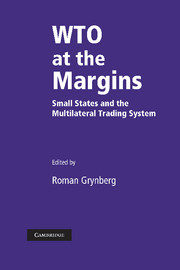Book contents
- Frontmatter
- Contents
- List of figures and appendices
- List of tables
- List of contributors
- Introduction
- Part I Theory and evidence
- Part II WTO and small economies
- 8 Small vulnerable economy issues and the WTO
- 9 Special and differential treatment for small developing economies
- 10 A study of alternative special and differential arrangements for small economies
- Part III WTO dispute settlement
- Part IV Negotiating issues and institutional arrangements
- Index
8 - Small vulnerable economy issues and the WTO
Published online by Cambridge University Press: 05 May 2010
- Frontmatter
- Contents
- List of figures and appendices
- List of tables
- List of contributors
- Introduction
- Part I Theory and evidence
- Part II WTO and small economies
- 8 Small vulnerable economy issues and the WTO
- 9 Special and differential treatment for small developing economies
- 10 A study of alternative special and differential arrangements for small economies
- Part III WTO dispute settlement
- Part IV Negotiating issues and institutional arrangements
- Index
Summary
Introduction
Since the second Ministerial Conference of the WTO held in Geneva in 1998 there has been an attempt by small, vulnerable economies (SVEs) to achieve some measure of recognition of the particular problems that confront them in the process of globalisation. At the failed Seattle Ministerial Conference the establishment of a work programme for small economies was agreed to by Members but as the draft text was not accepted it was left until the fourth session in Doha before a small economies work programme was agreed.
This chapter addresses several issues pertaining to the apparent contradiction in the wording of the work programme agreed to at Doha, which on the one hand mandates Members to frame responses to trade concerns of small, vulnerable economies, but on the other prohibits the creation of a sub-category of states. The relevant paragraph of the Ministerial Declaration was a political compromise between the small economy proponents of the WTO work programme, and developed countries which insisted on the definitional caveat. It has created a conundrum of sorts for negotiators, as it seems impossible to target responses to the concerns of a group that is yet to be defined or recognised because WTO Members have consistently refused to recognise SVEs as a distinct category. While the creation of a WTO sub-category of Members is explicitly prohibited in the work programme, this does not nullify the right of any WTO Member or group of Members to make a proposal during negotiations that includes such a group of countries.
- Type
- Chapter
- Information
- WTO at the MarginsSmall States and the Multilateral Trading System, pp. 281 - 308Publisher: Cambridge University PressPrint publication year: 2006
- 3
- Cited by



